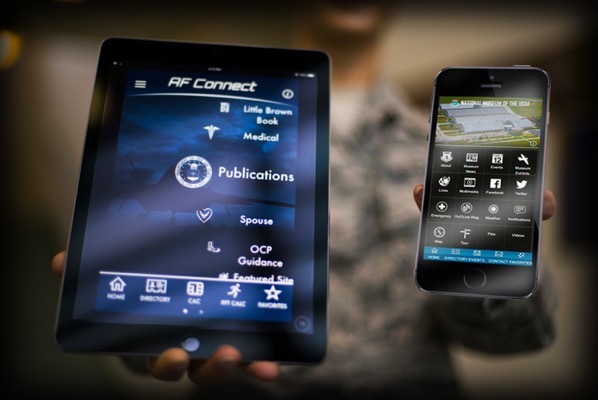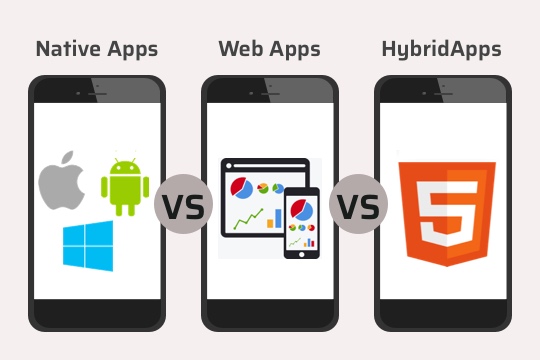Native App, Hybrid App, or somewhere in between?
I quite often get told “I want an app for my business”, not that they “need” one, they want one, which can often be the wrong place to start, as we’re justifying a want by creating the needs. Underneath it all there are many complex technical considerations and decisions to be made, often by us and trusted by the client, but these considerations come on the back of the business’s “needs” not it’s “wants”, and the app platform, is one of these.
So first off, what is a native app, or what app platforms are there? The lines are grey in the middle, so feel free to disagree with these definitions (happy to engage in the debate!) but broadly we have;
- Native Apps – In it’s purest sense these are apps written in the native programming language of the mobile device you’re targeting, eg;
-
- iOS (iPad and iPhone apps) – Uses Objective C (and now Swift)
- Android – Uses Java (not Javascript! More on that below)
- Windows Mobile – C# (pronounced C sharp)
- Blackberry – Java, however not the same as Android (Pre Blackberry 10), however the latest Blackberry Priv handset is in essence an Android device.
- Hybrid Apps (With Native UI) – These include platforms such as Xamarin, or Telerik AppBuilder, which is based on C# and F#, but the end result on each device is a ‘Native’ App using Native UI elements so the app feels at home to users on that platform. The end result is these are compiled down to ‘Native Apps’ on the device so often indistinguishable from true Native Apps.
- Hybrid Apps (With Cross Platform UI) – This is the biggest ‘app’ space at the moment, filled by vendors such as Phonegap / Cordova, Appcelerator Titanium, normally pitched at Web Developers trying to get into the mobile space as it appeals to their existing HTML5 and Javascript skill sets.
- Web Apps – Not really an app! Not in the mobile sense, but a traditional web site hosted and accessible to all and heavily optimised and responsive for mobile users.
So what are the pros and cons, and which do I need! Well there’s the conversation, but sit down with us for a cup of coffee, or engage with us and we’ll look at your “needs” and help you come to an informed decision, but some points to consider;
- So you want a mobile friendly, easily accessible, cheap (relatively) way to engage with a mobile audience? On any device, wherever they are connected. – Then consider a mobile optimised website, no need for app stores, or worrying about platform related decisions, just out there.
- Do you want to engage with the mobile audience? Eg send Push notifications, Know where they are physically located, use the camera, microphone etc? – Then for a good experience you need an App, that has access to the devices hardware, eg GPS, Camera, Microphone. Most Hybrid Apps will allow this, Native Apps without question.
- Do you want the user to work offline? Ie when no internet connection? – If the app is to work disconnected, without a live internet connection then you are in Native, or Hybrid with Native UI territory. The app will need to read and write to a local database to store your work when disconnected, and then ‘phone home’ when back online, this needs more complex cross platform background services and databases.
Another consideration is user experience, end users engage with their mobile so much these days that functional apps should be second nature, they should pick up your app and start using it, it should be obvious, which is where Native Apps, or Native UI based apps win every day. The best example is deleting a record from a list. On an iOS device you swipe left, and tap delete. On Android it’s press and hold, then Delete. On a Native App, or a framework such as Xamarin which uses the Native App user interface (in fact it uses the same user interface tools as Native Apps so you don’t get any closer!) then that’s what you get, your end user feels at home. Yet on Cordova / Phonegap based apps, which pitch themselves as code once, run everywhere, you have exactly the same user interface and design on Android as you do on iPhone (sounds good, right?), except what you’ve achieved is an interface that all users find confusing, it’s not ‘natural’ on an iPhone, or Android, so your users have to learn to use your App.

So what about the benefits to you, the customer? Well that comes down to price. Using a hypothetical example of an ‘app’ that needs to be on Android and iPhone, downloads user content from a web based Content Management System, that the user can interact and send content back including photos taken within the app, and the app owner can send push notifications based on GPS Location, your year 1 project prices differ as below;
- If you go fully native, and certainly if you want your app available on more than one platform then you need to write the app twice, once in Objective C for the iPhone, and again in Java for Android apps, near enough double your cost – £9500.
- A Hybrid, non native Cordova solution will be significantly cheaper, it gets written once, but your user experience suffers, based on the requirements above it’s possible though – £3000
- Somewhere in the middle, a Hybrid App with a native UI, such as a Xamarin, the back end and core workings of the app only have to be written once, in C# for example, so a considerable development time saving, but the user interface is written individually for each platform using Native tools to get the perfect experience – £5500. The clever ones amongst you will notice that we’ve not mentioned Xamarin Forms, which is the Amber Nectar, negates the need to design the UI for each platform, but still gives the benefit of native UI on each device, if this is appropriate for you (and often is for line of business apps), then the price could drop further to near £4500 suddenly less than half the price but all the benefits
So what’s the conclusion? There isn’t one, the best answer is to engage with your chosen app developer (us we hope!), have a cup of coffee or two and talk through your requirements and come to a sensible conclusion based on your “needs”. What’s more concerning, is for those of you out there that have already had a mobile app commissioned did you have a conversation along the lines of the above? Have you got what you “needed” or what you were given?
I make no pretences that I love Xamarin, more so now they’re backed by Microsoft, be it Xamarin Classic, or Xamarin forms I can offer you and your business incredible value, especially across multiple platforms, but I’m by no means restricted to them (I actually spend the majority of my time working on a Java / Groovy based Android app for tablets). I’m just as happy dropping into true Native technologies, or a quick win with Cordova, but the choice is yours, not mine.
For more information on Mobile App Development please Contact Me
PS: For the avoidance of doubt, anything generated by someone with a ‘mobile apps for bizness’ account costing you about £500, they’re not apps, they are badly hosted websites pretending to be an app (turn airplane mode on your device and start the app, what happens!). The reality is that you won’t get any return on your ‘bargain’ £500 app, you’re just £500 poorer, sorry ????
Andy Flisher is a Mobile App Developer based in the North East of England with over 20 years software development experience. He is available for hire and specialises in cross platform mobile app development, web applications, desktop software, bespoke cloud architecture solutions and providing outsourced project management services.
Footnote: Originally written in June 2006 but edited to make more current in January 2019 when republished

